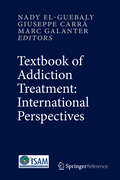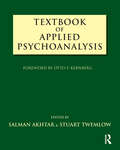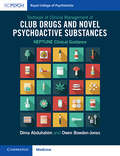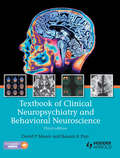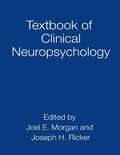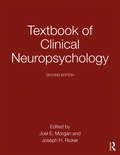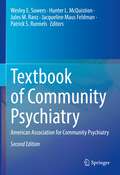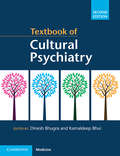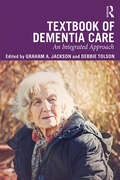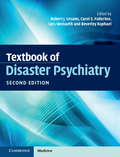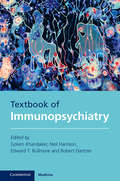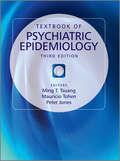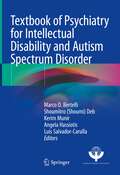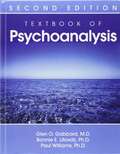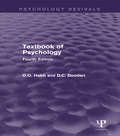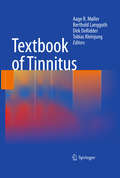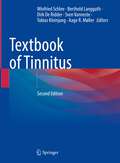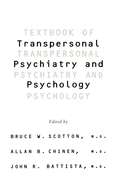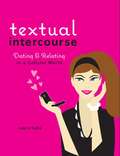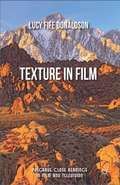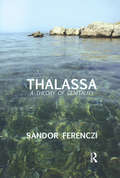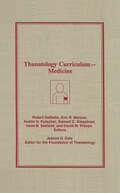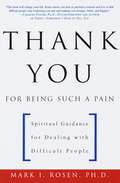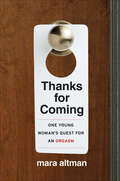- Table View
- List View
Textbook of Addiction Treatment: International Perspectives
by Marc Galanter Nady El-Guebaly Giuseppe CarràThis book examines the spectrum of addictions-related problems across different cultures worldwide, highlightingdifferences and similarities between clinical practices based on neurobiological similarities, and epidemiological and socio-cultural differences. "
Textbook of Applied Psychoanalysis
by Salman Akhtar Stuart W. TwemlowThe Textbook of Applied Psychoanalysis is a unique and original contribution to the field of psychoanalysis. Emphasizing and underscoring the need for interdisciplinary discourse in understanding the dialectical relationship between mind and culture, this volume addresses a multiplicity of realms. These include anthropology, religion, philosophy, history, as well as evolutionary psychology, medicine, race, poverty, migration, and prejudice. Dimensions of social praxis such as education, health policy, and cyberpsychology are also addressed. The enrichment of our understanding of the fine arts (e.g. painting, sculpture, poetry) and performing arts (e.g. music, dance, cinema) by the application of psychoanalytic principles and the enhancement of psychoanalysis by bringing such arts to bear upon it also form areas of this book's concern. This magisterial volume brings distinguished psychoanalysts, philosophers, musicians, poets, businessmen, architects, and movie critics together to create a chorus of modern, anthropologically-informed and culturally sensitive psychoanalysis.
Textbook of Applied Psychoanalysis
by Salman Akhtar and Stuart W. TwemlowThe Textbook of Applied Psychoanalysis is a unique and original contribution to the field of psychoanalysis. Emphasizing and underscoring the need for interdisciplinary discourse in understanding the dialectical relationship between mind and culture, this volume addresses a multiplicity of realms. These include anthropology, religion, philosophy, history, as well as evolutionary psychology, medicine, race, poverty, migration, and prejudice. Dimensions of social praxis such as education, health policy, and cyberpsychology are also addressed. The enrichment of our understanding of the fine arts (e.g. painting, sculpture, poetry) and performing arts (e.g. music, dance, cinema) by the application of psychoanalytic principles and the enhancement of psychoanalysis by bringing such arts to bear upon it also form areas of this book's concern. This magisterial volume brings distinguished psychoanalysts, philosophers, musicians, poets, businessmen, architects, and movie critics together to create a chorus of modern, anthropologically-informed and culturally sensitive psychoanalysis.
Textbook of Clinical Management of Club Drugs and Novel Psychoactive Substances: NEPTUNE Clinical Guidance
by Owen Bowden-Jones Dima AbdulrahimThere are global concerns about the proliferation and misuse of club drugs and novel psychoactive substances, yet we know little about their harms and research on clinical management and treatment remains limited. This book fills the knowledge gap by providing a detailed overview of the research evidence available to date. The book provides a framework that allows readers to understand this large number of new drugs, using classifications based on primary psychoactive effect. Within this framework, the book provides detailed reviews of the more commonly used drugs. Each chapter explores pharmacology, patterns and mode of use, acute and chronic harms, and clinical interventions supported by research evidence. An invaluable resource for clinical staff, this book will support clinicians working in the emergency department, substance misuse and addiction services, mental health services, primary care, sexual health services and more. It will also be of interest to academics and those developing drug policy.
Textbook of Clinical Neuropsychiatry and Behavioral Neuroscience, Third Edition
by David Moore Basant PuriHighly Commended, BMA Medical Book Awards 2013Previously published as Textbook of Clinical Neuropsychiatry, this book has been re-titled and thoroughly updated, redesigned, and enhanced to include the fundamentals of neuroscience. This highly acclaimed text provides a definitive, clinically oriented, yet comprehensive book covering neuropsychiatry
Textbook of Clinical Neuropsychology
by Joel E. Morgan Joseph H. RickerContaining 50 chapters by some of the most prominent clinical neuropsychologists, the Textbook of Clinical Neuropsychology sets a new standard in the field in its scope, breadth, and scholarship. Unlike most other books in neuropsychology, the Textbook is organized primarily around syndromes, disorders, and related clinical phenomena. Written for the clinician at all levels of training, from the beginner to the journeyman, the Textbook presents contemporary clinical neuropsychology in a comprehensive volume. Chapters are rich with reviews of the literature and clinical case material spanning a range from pediatric to adult and geriatric disorders. Chapter authors are among the most respected in their field, leaders of American Neuropsychology, known for their scholarship and professional leadership. Rarely have so many distinguished members of one discipline been in one volume. This is essential reading for students of neuropsychology, and all others preparing for careers in the field.
Textbook of Clinical Neuropsychology: Second Edition
by Joel E. Morgan Joseph H. RickerThe first edition of the Textbook of Clinical Neuropsychology set a new standard in the field in its scope, breadth, and scholarship. The second edition comprises authoritative chapters that will both enlighten and challenge readers from across allied fields of neuroscience, whether novice, mid-level, or senior-level professionals. It will familiarize the young trainee through to the accomplished professional with fundamentals of the science of neuropsychology and its vast body of research, considering the field’s historical underpinnings, its evolving practice and research methods, the application of science to informed practice, and recent developments and relevant cutting edge work. Its precise commentary recognizes obstacles that remain in our clinical and research endeavors and emphasizes the prolific innovations in interventional techniques that serve the field’s ultimate aim: to better understand brain-behavior relationships and facilitate adaptive functional competence in patients. The second edition contains 50 new and completely revised chapters written by some of the profession's most recognized and prominent scholar-clinicians, broadening the scope of coverage of the ever expanding field of neuropsychology and its relationship to related neuroscience and psychological practice domains. It is a natural evolution of what has become a comprehensive reference textbook for neuropsychology practitioners.
Textbook of Community Psychiatry: American Association for Community Psychiatry
by Jacqueline Maus Feldman Wesley E. Sowers Jules M. Ranz Hunter L. McQuistion Patrick S. RunnelsThe second edition of the AACP's (American Association for Community Psychiatry) Textbook of Community Psychiatry is a welcome update of this notable work that comprehensively presents the state of the art in this field. Along with continuously evolving scientific advances and principles of clinical care, community psychiatry must respond to shifts in public policy as well as economic climate. The past decade has witnessed significant political and social changes, including climate change, immigration levels, technological advancement, the influence of social media and the rise of political unrest. This new edition reflects these wider changes, incorporating new chapters and enhancing previous ones. It remains the standard text for certification of those working in healthcare and social welfare systems design and delivery of services. Readers will gain knowledge of:Basic pillars of the fieldEvidence based interventionsTelepsychiatry and technological aidsTrauma informed servicesIntegrated health systemsSocial determinants of healthStructural discrimination
Textbook of Cultural Psychiatry (2nd Edition)
by Dinesh Bhugra Kamaldeep BhuiCultural psychiatry deals with the impact of culture on causation, perpetuation and treatment of patients suffering with mental illness. The role of culture in mental illness is increasingly being recognised, and the misconceptions that can occur as a result of cultural differences can lead to misdiagnoses, under or over-diagnosis. This second edition of the Textbook of Cultural Psychiatry has been completely updated with additional new chapters on globalisation and mental health, social media and tele-psychiatry. Written by world-leading experts in the field, this new edition provides a framework for the provision of mental health care in an increasingly globalised world. The first edition of the Textbook of Cultural Psychiatry was commended in the BMA Book Awards in 2008 and was the recipient of the 2012 Creative Scholarship Award from the Society for the Study of Psychiatry and Culture.
Textbook of Dementia Care: An Integrated Approach
by Debbie Tolson Graham A JacksonTextbook of Dementia Care: An Integrated Approach gives an overview of dementia care at a level appropriate to health and social care students, as well as providing an update to experienced practitioners. Authors come from a variety of backgrounds including nursing, psychiatry, medicine, psychology and allied health professions. There is a good mix of content from experienced new authors, academics and practitioners. The book offers: a comprehensive list of contributors from different disciplines input from people living with dementia and their family carers relevant research to inform practice case examples to illustrate and inform the text. While directed primarily at a nursing and social care readership, the book also provides a readable general text appropriate for all involved in dementia care. It is written by expert practitioners in the field, many of whom are leaders in practice-based research. It incorporates the expertise of representatives of Alzheimer Scotland, but also includes accounts of people living with dementia, families, and carers, giving the reader a unique insight into the disease.
Textbook of Disaster Psychiatry, Second Edition
by Robert J. Ursano Fullerton Carol S. Lars Weisaeth Beverley RaphaelCovering both natural and man-made scenarios including war and terrorism, the Textbook of Disaster Psychiatry is a vital international reference for medical professionals, community leaders and disaster responders a decade after its initial publication. Spanning a decade of advances in disaster psychiatry, this new and updated second edition brings together the views of current international experts to offer a cutting-edge comprehensive review of the psychological, biological and social responses to disaster, in order to help prepare, react and aid effective recovery. Topics range from the epidemiology of disaster response, disaster ecology, the neurobiology of disaster exposure, to socio-cultural issues, early intervention and consultation-liaison care for injured victims. The role of non-governmental organizations, workplace policies and the implications for public health planning at both an individual and community level are also addressed. The comprehensive examination of disaster and its impact gives the book both clinical and public health relevance The text has been updated to cover a decade of advances, leading to more effective approaches to preparation, treatment, intervention and therefore recovery Concepts and approaches are applied to worldwide needs, resulting in a text relevant to real life practice
Textbook of Immunopsychiatry
by Edward Bullmore Neil Harrison Robert Dantzer Golam KhandakerThe rapidly growing field of immunopsychiatry combines expertise and insights from immunology, psychiatry and neuroscience to understand the role of inflammation and other immune processes in causing and treating mental illness. This represents a major shift in mental health science, traditionally focused on psychological and neuronal mechanisms of depression, psychosis and dementia. This book provides the first comprehensive overview of recent, inter-disciplinary research linking disordered function of the immune system to the brain and mental illness. It offers a broad and deep perspective on the implications of immune system involvement in psychiatric disorders, including a balanced focus on basic science and clinical applications. Chapters cover the scientific evidence linking immune processes to major mental illnesses such as schizophrenia, depression, anxiety and dementia. An invaluable guide for graduate students, doctors in training, scientific researchers and others interested in the link between the immune system and mental health.
Textbook of Psychiatric Epidemiology
by Ming T. Tsuang Peter Jones Mauricio TohenThe new edition of this critically praised textbook continues to provide the most comprehensive overview of the concepts, methods, and research advances in the field; particularly the application of molecular genomics and of neuroimaging. It has been revised and enhanced to capitalize on the strengths of the first and second editions while keeping it up-to-date with the field of psychiatry and epidemiology. This comprehensive publication now includes chapters on experimental epidemiology, gene-environment interactions, the use of case registries, eating disorders, suicide, childhood disorders and immigrant populations, and the epidemiology of a number of childhood disorders. As in the first and second editions, the objective is to provide a comprehensive, easy to understand overview of research methods for the non-specialist. The book is ideal for students of psychiatric epidemiology, psychiatric residents, general psychiatrists, and other mental health professionals. The book features a new editor, Peter Jones, from the University of Cambridge, who joins the successful US team of Ming Tsuang and Mauricio Tohen.
Textbook of Psychiatry for Intellectual Disability and Autism Spectrum Disorder
by Angela Hassiotis Marco O. Bertelli Shoumitro Shoumi Deb Kerim Munir Luis Salvador-CarullaThis textbook provides a state of the art of the knowledge on the prevalence, risk and etiological factors, clinical features, assessment procedures and tools, diagnostic criteria, treatment, and prognosis of the psychiatric disorders encountered in people with intellectual disability (ID) and low-functioning autism spectrum disorder (ASD). ID and ASD represent two meta-syndromic groups of several different conditions, each with particular cognitive and communication features. People with ID/ASD display an increased prevalence of a variety of psychiatric disorders, including psychotic disorders, mood disorders, anxiety and stress-related disorders, somatoform disorders, and obsessive-compulsive disorder, as well behavioral syndromes, personality disorders, and disorders due to psychoactive substance use. This book will enable readers to understand the specificities of psychiatric disorders in the context of ID/ASD. It explains clearly how diagnostic criteria and assessment procedures for psychiatric disorders that were created for the general population have to be modified for use with ID/ASD. Above all, it will enable clinicians to overcome difficulties in diagnosis and to deliver more effective care that meets the particular needs of patients with ID/ASD.
Textbook of Psychoanalysis
by Paul Williams Glen O. Gabbard Bonnie E. LitowitzThe only comprehensive textbook of psychoanalysis available in the United States, the Textbook of Psychoanalysis was written with both the beginning student in the mental health care professions and the practicing analyst in mind. In a single volume, the editors have compiled contributions that cover the history of psychoanalysis, the major theoretical models, and all facets of treatment and technique. This pluralistic approach is consistent with the conceptual and clinical diversity of contemporary American psychoanalysis, the focus of this newly revised work. <p><p>The book also reflects the exponential increase in research activity within psychoanalysis, and the section on research is both up to date and substantive. Also current and extensive is the coverage of the interface between psychoanalysis and other disciplines, such as neuroscience. This interdisciplinary emphasis is one of the many strengths of this new edition. The editors have created a format that logically and painlessly educates and engages. No other volume offers the range of topics, the depth of coverage, or the accessible writing style of this groundbreaking text.
Textbook of Psychology (Psychology Revivals)
by D.O. Hebb D.C. DonderiDonald Hebb was one of the most influential psychologists of the 20th century and the first version of this textbook was written in 1958. This 4th edition, co-authored with Donderi, was originally published in 1987 and the object of the book was to introduce the student to the scientific study of the human mind and behaviour. The authors’ concern was with scientific psychology and fundamental principles. They felt this understanding was the best preparation to following future developments in psychological knowledge and to understand the changes in how that knowledge was applied. Although psychology has developed in many directions since its publication, much of the information in this book is still relevant today.
Textbook of Tinnitus
by Aage R. Møller Dirk Deridder Tobias Kleinjung Berthold LangguthGroundbreaking, comprehensive, and developed by a panel of leading international experts in the field, Textbook of Tinnitus provides a multidisciplinary overview of the diagnosis and management of this widespread and troubling disorder. Importantly, the book emphasizes that tinnitus is not one disease but a group of rather diverse disorders with different pathophysiology, different causes and, consequently, different treatments. This comprehensive title is written for clinicians and researchers by clinicians and researchers who are active in the field. It is logically organized in six sections and will be of interest to otolaryngologists, neurologists, psychiatrists, neurosurgeons, primary care clinicians, audiologists and psychologists. Textbook of Tinnitus describes both the theoretical background of the different forms of tinnitus and it provides detailed knowledge of the state-of-the-art of its treatment. Because of its organization and its extensive subject index, Textbook of Tinnitus can also serve as a reference for clinicians who do not treat tinnitus patients routinely.
Textbook of Tinnitus
by Sven Vanneste Aage R. Møller Tobias Kleinjung Berthold Langguth Dirk De Ridder Winfried SchleeThis book describes the theoretical background of the different forms of tinnitus (ringing in the ears) and detailed knowledge of state-of-the-art treatments of tinnitus. Tinnitus has many forms, and the severity ranges widely from being non-problematic to severely affecting a person’s daily life. How loud the tinnitus is perceived does not directly relate to how much it distresses the patient. Thus, even tinnitus very close to the hearing threshold can be a disabling symptom. It can reduce the quality of life by generating anxiety and concentration problems, impairing the ability to do intellectual work, making it difficult to sleep, causing depression and sometimes even leading to suicide.Textbook of Tinnitus has filled a void by providing a comprehensive overview about the different forms of tinnitus, their pathophysiology and their treatment. However, since the publication of the first edition of the Textbook of Tinnitus in 2011, tinnitus research has dramaticallyevolved. In view of the substantial increase in knowledge, most chapters in this second edition are newly written and a few original chapters have had major updates. This edition has nine sections, covering the basics of tinnitus, the neurobiology of tinnitus, pathophysiological models, animal research, diagnosis and assessment, various forms of management and treatment, and finally, a look at the future of tinnitus and tinnitus research. The book will be of great interest to otolaryngologists, neurologists, psychiatrists, neurosurgeons, primary care clinicians, audiologists and psychologists, and students. Because of its organization and its extensive subject index, Textbook of Tinnitus, Second Edition can also serve as a reference for clinicians who do not treat tinnitus patients routinely.
Textbook of Transpersonal Psychiatry and Psychology
by Bruce W. Scotton Allan B. Chinen John R. BattistaThis important new book brings together the work of top scholars and clinicians at leading universities and medical centers on the benefits and risks of transpersonal therapy. After comparing a variety of multicultural approaches--Zen Buddhism, existential phenomenology, and Christian mysticism, among many others--the book offers a wealth of information on specific disorders and the application of transpersonal psychology techniques such as visualization, breathwork, and "past lives” regression. With solid scholarship, wide scope, and accessible style, Textbook of Transpersonal Psychiatry and Psychology will become the standard work for students, researchers, clinicians, and lay readers interested in extending psychiatry and psychology into sciences that describe the functioning of the human mind, thereby building bridges between those disciplines and spirituality.
Textual Intercourse
by Laura SabaForget instant messaging and e-mail?we are undergoing a text message revolution Text messaging is the newest and preferred wave of communication for the younger demographic and the number one application of cell phones. The market is ripe for this relationship guide for texters With this new trend come all kinds of questions and confusion concerning textual communication and protocol within relationships girls never would have imagined a generation ago. Tantalizing topics include: ? The dos and donOCOts of texting your significant other? Interpreting exactly what his text messages mean? Finding the right balance between texting and in-person communication? The ins and outs of building textual confidence? The art of textual flirtation? And so much more This revealing and useful book demonstrates exactly how those tiny text messages you send today can create big success for your love life tomorrow. "
Texture in Film
by Lucy Fife DonaldsonDrawing on interdisciplinary perspectives of art, literature and music, Donaldson develops a stimulating understanding of a concept that has received little detailed attention in relation to film. Based in close analysis, Texture in Film brings discussion of style and affect together in a selection of case studies drawn from American cinema.
Thalassa: A Theory of Genitality
by Sandor FerencziThis book expands the symbols of the phallus and vagina into cosmic symbols, not by reference to myths but by his interpretations of embryonic, physiological, psychological facts. It develops the view that the whole of life is determined by a tendency to return to the womb, equating the process of birth with the phylogenetic transition of animal life from water to land, and linking coitus to the idea of "thalassal regression": "the longing for the sea-life from which man emerged to primeval times".
Thanatology Curriculum Medicine
by Austin H. Kutscher Irene B. Seeland Robert DeBellis Eric R. Marcus Samuel C. Klagsbrun David W. Preven Jeanne D. ColeOffering practical suggestions for humane caregiving, this valuable new book is aimed at all providers of medical care. This compassionate volume focuses on the development of the thanatology curriculum--teaching caregivers who are just beginning their professional lives to be adequately prepared to deal appropriately with dying patients and their families and to cope with the personal toll exacted by this aspect of medical practice. At a time when increasingly complex medical technology promotes more impersonal contact between caregivers and patients, the contributors emphasize the importance of providing compassionate, responsive, and humane care to those whose lives are ending.
Thank You for Being Such a Pain: Spiritual Guidance for Dealing with Difficult People
by Mark RosenWith wisdom and humor, Thank You for Being Such a Pain offers gentle and compassionate guidance for understanding and healing relationships with difficult people. By embracing four fundamental premises and putting into practice the author's many helpful and practical suggestions, you'll acquire the skills and insights necessary for turning around even the most troublesome relationship. What you need to keep in mind is that: (1) nothing in your life happens randomly and your difficulties have a deeper purpose; (2) frustration and even emotional pain are as necessary for your personal and spiritual growth as love and joy; (3) transforming enmity and completing unfinished business may be the most important skills you can learn in life; and (4) when you make an effort to work on your inner self, your outer relationships will be transformed. This groundbreaking book draws upon state-of-the-art psychological principles and timeless spiritual practices from all traditions. Filled with enlightening exercises and entertaining stories, Thank You for Being Such a Pain will forever change the way you see the difficult people in your life . . . as well as the way you see yourself.From the Trade Paperback edition.
Thanks for Coming: One Young Woman's Quest for an Orgasm
by Mara AltmanA young woman chronicles her search for an orgasm—and the elusive connections between sex and love—in this uproarious and touching memoir.“[Altman] writes about the parade of research scientists, professional dominants, and prospective boyfriends with self-deprecating humor and a grudging recognition of what others peg as her sexual and emotional immaturity. . . . Inspiring.” —Publishers WeeklyTwenty-six-year-old Mara Altman wanted to know what all the screaming was about. She’d lost her virginity at seventeen; grown up in southern California with sexually free parents; had lovers in India, Burma, and Peru; and spent a year in Bangkok observing all manner of depravity. And yet she was an attractive, successful, single woman in New York who’d never had an orgasm.And so she embarked on a wildly funny, emotionally resonant odyssey—a journey both inside and outside herself—only to discover that, for Mara, orgasm was connected to a part of her that no vibrator could reach. Thanks for Coming is one woman’s look at our obsession with and anxiety over the female orgasm. Her quest to get her own yields poignant results that will surprise even the sexually awakened among us. From sex shows to sex conventions, from a therapist's couch to her own couch, from the bedroom to the bar, Mara Altman proves to be a guide as hilarious as she is investigative.
